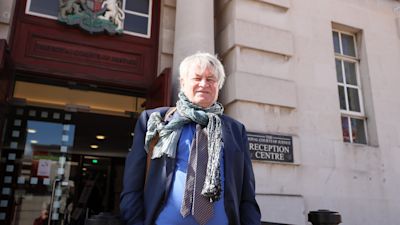Failure to establish Northern Ireland's abortion services 'deeply troubling'

The Government's failure to establish full abortion services for women in Northern Ireland is a "lamentable and deeply troubling exercise in finger-pointing", the High Court in Belfast has heard.
The Northern Ireland Human Rights Commission has launched a judicial review against Secretary of State Brandon Lewis, as well as the Northern Ireland Executive and the region's Department of Health over their failure to commission and fund abortion services.
However, while individual health trusts have been offering services on an ad-hoc basis, the Department of Health had yet to centrally commission the services.
In March, Mr Lewis took powers that would allow him to direct Stormont to set up services, but he has not done so yet.
David Blundell QC, representing the Northern Ireland Human Rights Commission, asked the judge, Mr Justice Colton, to order the Secretary of State to set out a strict timetable for the commission of abortion services.
He said: "This is a challenge to the Secretary of State's failure expeditiously to provide a comprehensive abortion service in Northern Ireland."
He said there had been been an "abdication of legal responsibility" by all three parties.
He added: "I want to make four headline points at the outset.
"First of all, abortion is now legal in Northern Ireland and has been since 31 March 2020.
"Secondly, the Secretary of State is under a legal duty imposed by Parliament to introduce the required abortion services expeditiously, recognising the importance of doing so to the human rights of women in Northern Ireland.
"Thirdly, in practice, women in Northern Ireland do not have access to abortion services to which they are entitled by law, so that is more than a year, 14 months, without those services.
"Fourthly, we say the impact on those women is significant and has been known by the Secretary of State."
"The Secretary of State says it is for the department to commission services and the department has failed to do so.
"The department says it is obliged to bring the matter to the attention of the Executive.
"The Executive denies that it is anything to do with it."
The Northern Ireland Human Rights Commission's case supports a woman who was affected by the lack of commissioning of services during the Covid-19 pandemic.
Mr Blundell referred to a series of correspondences which he said showed that the Secretary of State would have been aware of the difficulties faced by the Department of Health in introducing abortion services and that he should have intervened personally.
He read from a letter sent by Northern Ireland Health Minister Robin Swann to Mr Lewis on 31 March 2020 which stated that his department was facing a funding shortfall of £661million and that commissioning abortion services was something that he would have to refer to the Executive.
Mr Blundell said: "There can be no doubt that the Secretary of State, written to personally by the Health Minister, knew that funding was a major issue and it was absolutely clear that this matter was going to go to the Executive."
He then referred to a phone call between Mr Lewis and Northern Ireland First Minister Arlene Foster and deputy First Minister Michelle O'Neill on 8 October last year.
He said: "The Secretary of State said he wanted to raise abortion and he asked the First Minister where she thinks things will move and she said she is clear on the position that they cannot agree as an Executive and will not be able to progress it through the Executive.
"That is the point at which it cannot be said any longer that the Secretary of State wasn't aware and that he needed to take direct action.
Mr Blundell continued: "Women in Northern Ireland still face the deplorable choice of travelling to England, accessing regulated internet services or carrying an unwanted pregnancy to term.
"Covid is not an excuse.
"It makes it even more important to carry out the required changes because women could not even access the interim solution of travelling to England.
"What has been done is the prioritisation of political sensitivities over and ahead of the statutory endorsed rights of women."
The case will resume on Thursday when it will hear evidence from representatives for the Secretary of State, the Department of Health and the Stormont Executive.
Analysis from political editor Tracey Magee: